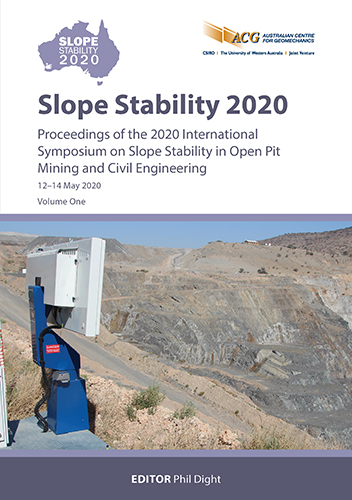Application of a hybrid approach to the design of anchored wire meshes on steep slopes

|
Authors: Galli, A; Deana, M; Mazzon, N |
DOI https://doi.org/10.36487/ACG_repo/2025_53
Cite As:
Galli, A, Deana, M & Mazzon, N 2020, 'Application of a hybrid approach to the design of anchored wire meshes on steep slopes', in PM Dight (ed.), Slope Stability 2020: Proceedings of the 2020 International Symposium on Slope Stability in Open Pit Mining and Civil Engineering, Australian Centre for Geomechanics, Perth, pp. 823-830, https://doi.org/10.36487/ACG_repo/2025_53
Abstract:
Anchored steel meshes are commonly employed stabilising systems for potentially unstable granular layers (e.g. soil or highly fragmented weak rock) on slopes against translational failure mechanisms. They are usually conceived as passive stabilising intervention (i.e. their stabilising action is provided only upon the activation of a given displacement field into the unstable layer). As a consequence, standard design methods, generally based on ultimate limit state (ULS) approaches, can potentially be largely unsafe, since they assume the full mobilisation of both the ultimate soil resistance and the ultimate tensile force in the steel mesh independently of the displacement amplitude of the unstable layer. In this paper a design procedure, based on so called ‘hybrid’ approaches, is described with specific reference to relatively steep slopes. The key concept is the use of a suitable characteristic curve, describing the mechanical response of the entire system (steel plate, steel mesh, soil layer) as a function of the displacement amplitude, thus providing a safe and consistent estimation of the mobilised stabilising action for the required safety level.
Keywords: anchored steel meshes, design procedure, hybrid methods
References:
Boschi, K, di Prisco, C, Flessati, L, Galli, A, Tomasin & M 2019, ‘Punching tests on deformable facing structures: numerical analyses and mechanical interpretation’, in F Calvetti, F Cotecchia, A Galli & C Jommi (eds), Proceedings of the 7th Italian National Congress of Geotechnical Researchers, Lecture Notes in Civil Engineering, vol. 40, pp. 429–437.
di Prisco, C, Besseghini, F & Pisanò, F 2010, ‘Modelling of the mechanical interaction between anchored wire meshes and granular soils’, Geomechanics and Geoengineering: An International Journal, vol. 5, no. 3, pp. 137–152.
Galli, A & Deana, M 2020, ‘Hybrid design approaches for anchored wire meshes: towards a displacement based design’ presented at the Transportation Research Board Annual Meeting 2020, Washington DC.
Galli, A & di Prisco, C 2013, ‘Displacement-based design procedure for slope-stabilizing piles’, Canadian Geotechnical Journal, vol. 50, pp. 41–53.
Galli, A, Maiorano, RMS, Di Prisco, C & Aversa, S 2017, ‘Design of slope-stabilizing piles: from ultimate limit state approaches to displacement based methods’, Rivista Italiana di Geotecnica, vol. 51, no. 3, pp. 77–93.
Italian Ministry of Education, University and Research 2011, Landslide Risk Mitigation using Sustainable Solutions, research program Rome.
© Copyright 2026, Australian Centre for Geomechanics (ACG), The University of Western Australia. All rights reserved.
View copyright/legal information
Please direct any queries or error reports to repository-acg@uwa.edu.au
View copyright/legal information
Please direct any queries or error reports to repository-acg@uwa.edu.au
